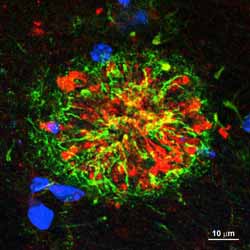Chronic inflammation in the brain leads the way to Alzheimer's Disease

In mice genetically modified to produce the human version of Aß (green), the viral-like challenge drastically increased the amount of Aß at precisely the sites of inflammation-induced APP deposits (red). picture: UZH<br>
To date it has been difficult to pin down the role of inflammation in Alzheimer's disease (AD), especially because trials of NSAIDs appeared to have conflicting results.
Although the ADAPT (The Alzheimer's Disease Anti-inflammatory Prevention Trial) trial was stopped early, recent results suggest that NSAIDs can help people with early stages of AD but that prolonged treatment is necessary to see benefit.
Researchers from the University of Zurich, in collaboration with colleagues from the ETH Zurich and University of Bern investigated what impact immune system challenges (similar to having a severe viral infection) would have on the development of AD in mice. Results showed that a single infection before birth (during late gestation) was enough to induce long-term neurological changes and significant memory problems at old age.
These mice had a persistent increase in inflammatory cytokines, increased levels of amyloid precursor protein (APP), and altered cellular localization of Tau. If this immune system challenge was repeated during adulthood the effect was strongly exacerbated, resulting in changes similar to those seen for pathological aging.
Dr Irene Knüsel who led this research explained, “The AD-like changes within the brain of these mice occurred without an increase in amyloid ß. However, in mice genetically modified to produce the human version of Aß, the viral-like challenge drastically increased the amount of Aß at precisely the sites of inflammation-induced APP deposits. Based on the similarity between these APP/Ab aggregates in mice and those found in human AD, it seems likely that chronic inflammation due to infection could be an early event in the development of AD.”
Literature:
Dimitrije Krstic, Amrita Madhusudan, Jana Doehner, Prisca Vogel, Tina Notter, Claudine Imhof, Abigail Manalastas, Martina Hilfiker, Sandra Pfister, Cornelia Schwerdel, Carsten Riether, Urs Meyer and Irene Knuesel. Systemic immune challenges trigger and drive Alzheimer-like neuropathology in mice. Journal of Neuroinflammation, 2 July, 2012
Contact:
PD Dr. Irene Knüsel
Institute of Pharmacology and Toxicology
University of Zurich
Phone +41 44 635 59 97
Email: knuesel@pharma.uzh.ch
Media Contact
More Information:
http://www.uzh.chAll latest news from the category: Life Sciences and Chemistry
Articles and reports from the Life Sciences and chemistry area deal with applied and basic research into modern biology, chemistry and human medicine.
Valuable information can be found on a range of life sciences fields including bacteriology, biochemistry, bionics, bioinformatics, biophysics, biotechnology, genetics, geobotany, human biology, marine biology, microbiology, molecular biology, cellular biology, zoology, bioinorganic chemistry, microchemistry and environmental chemistry.
Newest articles

Innovative 3D printed scaffolds offer new hope for bone healing
Researchers at the Institute for Bioengineering of Catalonia have developed novel 3D printed PLA-CaP scaffolds that promote blood vessel formation, ensuring better healing and regeneration of bone tissue. Bone is…

The surprising role of gut infection in Alzheimer’s disease
ASU- and Banner Alzheimer’s Institute-led study implicates link between a common virus and the disease, which travels from the gut to the brain and may be a target for antiviral…

Molecular gardening: New enzymes discovered for protein modification pruning
How deubiquitinases USP53 and USP54 cleave long polyubiquitin chains and how the former is linked to liver disease in children. Deubiquitinases (DUBs) are enzymes used by cells to trim protein…



